- Home
- Michael Dobbs
The Touch of Innocents Page 9
The Touch of Innocents Read online
Page 9
Men.
She recalled the time she had gained an exclusive interview with the newly installed President of Peru less than a fortnight after his military coup. He had sat magisterial and bemedalled behind the presidential desk, overshadowed by a huge oil portrait of himself, while she had stood asking the pointed questions about death squads and Opposition leaders who had vanished in the middle of the night. With great patience and considerable charm, he had answered all her questions by turning to face the three men who comprised her crew. Not once during the entire interview had he looked at her directly except to ogle her breasts; it seemed impossible for him to comprehend that she could be there for anything other than decoration. And to make the tea.
Izzy looked at Pomfritt and inclined her head. ‘Thank you. I don’t take sugar.’
The Consular Officer looked around the kitchen in considerable confusion, he’d never done battle with an Aga stove before. He hopped, flapped his wings, searching in vain for an electric kettle until, to his considerable relief, he was rescued by the arrival of a voluminous, tent-like apparition who turned out to be Sally, the housekeeper, and very good at making heavy-duty orange tea.
‘I’m grateful you have come so promptly, Mr Pomfritt,’ Izzy offered in truce.
Pomfritt put down his cup and with some care wiped his moustache. The grooming was a mistake; it only helped to emphasize the lack of anything resembling a chin. ‘My pleasure to help, Miss Dean. Particularly when the request comes from a man such as Mr Devereux.’
‘He carries a lot of weight with the Embassy?’
‘With everyone right now.’ His head bobbed forward, as though pecking at corn seeds on a farmyard floor. ‘Confidentially – I’m sure I can trust you to treat this purely as background, Miss Dean – many of us think he has an excellent chance of taking over from the Prime Minister within the next couple of years. And even if that weren’t the case, as Defence Secretary he carries a mighty big stick with us Americans.’ He was lisping once more.
Izzy’s nostrils flared. This one was typical State. Yesterday’s cable news served up as today’s confidential briefing.
‘You mean the Duster?’ she enquired.
‘You’re familiar with it? Of course, Miss Dean, your job. Well, it’s no federal secret that the Administration values this project highly and there’s quite a game of poker being played. Paul Devereux seems to be holding one damn’ fine deck of cards, if you know what I mean. We want to be very good friends with him.’
She adjusted Benjy’s position on her lap; in the warmth of the kitchen he’d quickly fallen asleep. She prayed he wouldn’t pee himself. ‘Tell me, why is it so important?’
‘It’s important in its own right, Miss Dean.’ He had that irritating and unnecessary habit of repeating the names of those with whom he was talking, as though by constant emphasis he could persuade them of his integrity and good intentions. Straight out of Foggy Bottom via Dale Carnegie. ‘It’s important for our defence strategy; thousands of jobs are swinging on it. But there’s more, much more. You see, it has great significance not just for impressing our potential enemies, but also our allies. If we can get our act together with Europe on this one, it could open the door to all sorts of collaborative projects. A new supersonic transport to take over from Concorde. Co-operative ventures in space – a new space station, perhaps.’
‘Using our NASA shuttle, of course,’ she added conspiratorially.
He appeared oblivious to her sarcasm. ‘Even holding each other’s hands on things like a new generation of fusion power plants and the reprocessing of dangerous wastes. You see, Miss Dean, there’s a lot of heavyweight baggage piled on the back of this particular pony, and right at this moment Mr Devereux’s got control of the reins.’
‘I seem to have fallen into very powerful company.’
‘You surely have. But let me assure you we would have come hotfoot out to help you in any event. You’ve been through a lot and the American Embassy is delighted to help.’
The moustache bristled and twisted as if imbued with a life of its own; she realized he was trying to smile.
‘So, Miss Dean, tell me a little about your accident.’
And it was very little. A few second-hand details, large gaps in the narrative, she wasn’t even sure about date and location.
‘No means of identification left at all?’
‘None this side of Paris.’
‘Could your husband help?’
‘Could. But won’t. We’re divorcing.’
‘A friend in Paris, perhaps. The cleaner. Someone who has the keys to your apartment and can send on some sort of documentation?’
Izzy sat there for a moment, lost in concentration. ‘I’m sure I have a cleaning lady, Mr Pomfritt. Trouble is, I can’t for the life of me remember a thing about her.’
‘Your passport number. Can you remember your passport number, by any chance?’
‘My date of birth. I can remember my date of birth.’
The Consular Officer’s moustache was wriggling with considerably less animation. She wasn’t being a lot of help. ‘I see. Well, it could take a couple of days for me to sort things out. I’ll need photographs from you. Have to get confirmation from the local police about particulars of the accident, send to Washington for documentary evidence of your details, that sort of thing. We need that before we are allowed to issue a replacement passport. But in the meantime I have this for you.’
From the rear of his file he extracted an envelope which bore the eagle crest of American officialdom.
‘It’s a letter of introduction, a temporary ID which states who you are and asks anyone with queries to check them with me at the Embassy. It’s a fallback, just in case you should need it.’
‘Funny,’ Izzy mused, ‘without an official identity it’s as though you don’t really exist.’
‘You exist, Miss Dean, I can assure you.’ The smile began revitalizing. ‘Trouble is, you can’t prove it!’
‘There’s something else I’d welcome your help in trying to prove, Mr Pomfritt.’
‘Name it, ma’am.’
‘My baby. They said my baby died in the crash. I just don’t believe them.’
The moustache stood frozen in mid-wriggle. ‘My good Lord. What are you trying to tell me?’
She picked her words hesitatingly. ‘I’m … just not sure. You see, I think someone may have made a mistake.’
‘Who?’
‘I’m not sure about that either. But I don’t believe the baby who died in the hospital was mine.’
‘Oh, I see.’ He guarded himself, expecting imminent tears. Pomfritt was a bachelor, self-reliant, occasionally gay, one who had always been too unadventurous to allow the sensibilities of a woman to gush untrammelled across the emotional desert of his neat and orderly life. ‘Why do you think that, Miss Dean?’
‘The baby who died in hospital had different colour hair from Bella.’
‘You asked them to double check?’
‘Can’t. They cremated the body almost immediately after the autopsy.’
‘That’s … unusual,’ he conceded, picking his words with great caution. He was treading on the thin ice of bureaucratic procedures. ‘But you must realize, Miss Dean, there is almost nothing we can do. Or, indeed, should do. You know, I’ve been in many different parts of the world and Britain has the most reliable records system of anywhere I’ve been, better even than the States.’
‘Mr Pomfritt, I too have been in many different parts of the world, and I know mistakes can happen.’
‘But in this case how? Why?’
‘That I don’t know. That’s why I need your help.’
Pomfritt attempted to suck his moustache with his bottom lip which served to make talking difficult. ‘Miss Dean, apart from the colour of the hair, why else do you think a mistake has been made?’
Izzy remained silent for a moment. This was the difficult bit.
‘My son told me that Bella had been taken away.
By a blonde woman.’
‘Your son. Benjamin.’ He indicated the sleeping infant.
She nodded.
‘And what else, Miss Dean?’
She took a breath. It had to come eventually.
‘Instinct.’ It wasn’t enough. ‘And I have dreams,’ she blurted, rushing it.
‘Instinct. And you have dreams,’ he repeated pointedly, condemning her in her own words.
That was it, wasn’t it, she told herself. All of it.
‘Please, Miss Dean, listen to me carefully. I want to help you, believe me I do. But the greatest help I can be is to put it to you frankly: isn’t it just possible that your accident coupled with your bereavement have, in some way …’ – he hesitated, but couldn’t stifle the lisp – ‘misled you? Clouded your judgement? Made you believe things you want to believe, rather than what you ought to believe?’
‘It’s possible. But not certain.’ She felt defensive, her logic as inadequate as her evidence.
‘Step outside yourself for a moment, become the journalist again. If someone came to you with a story such as this, what would be your response?’
Her head began to drop. She knew what her response would be. Reassurance. Psychiatric counselling. Tranquillizers. Scepticism. Everything they had been thrusting at her all day. Her silence spoke for itself.
‘Look, why don’t you think about this for a couple of days, mull it over and see if you haven’t perhaps twisted things a little out of proportion. When I come back we can discuss it again. That’s a promise.’
What did she have to place against such good advice? Hardly any evidence. No more than a nagging doubt that things didn’t quite fit. A fluttering inside. A hope, a mystical and entirely unsound hope, that Bella might be out there. Somewhere. Somehow.
There was no point in pressing the matter. She thanked him and quickly he had gone – flapped and flown, without waiting for a second cup of tea.
It took her no time to settle in; she had nothing to unpack that didn’t fit in her carrier bag, the contents of which amounted to a few toiletries, one change of clothes for them both, a plastic racing car and a cuddly rabbit with a tattered ear.
Sally showed her to their bedroom, in the original wing of the house, a seventeenth-century farm cottage with undersized rooms and low ceilings, from which the rest of the house had grown southward like a vine thrusting towards the sun. From the outside it suggested a traditional country residence; inside Devereux had modified and enlarged so that reception rooms swept on one after the other, offering light and space while retaining the ancient charms of irregular beams and inglenook fireplaces. The fruit of this architectural vine was Devereux’s office, a wide semicircular room set on the southernmost end of the house offering a panoramic view across the vale in the manner that a ship’s bridge might view an approaching coastline.
The house was surprising, deceptive even. Behind the solid oak doors and traditional, rose-shrouded window frames she had expected to find olde English paraphernalia – a few warming pans, much polished brass and hunting prints, a couple of retrievers, perhaps, not the original and oriental pieces that so obviously interested Devereux. She particularly liked the life-sized Burmese dancing maiden which carried the scars of two centuries with grace and still retained much of the original gilding, and wrinkled her nose in captivation at the carved wood panel with its minutely detailed carving of a young woman servicing four men at the same time. It was an ancient temple frieze, from India, she assumed. God is Love.
And God is Death. God Is. But inside Izzy, where He might have been, there was nothing. She felt like a gutted fish.
She asked for a telephone. Sally told her Devereux had insisted she use his office, already tidied and prepared for her – it looked sparse, meticulously appointed but not a piece of paper to be seen, everything presumably fastened away behind the security locks of the tall metal filing cabinets.
From the windows she gazed across the vale. The fields stretched like patchwork, the soil newly turned, the low-lying meadows rain-sodden and flooded, the surrounding hills green, understated, very English.
With a desperate sense of urgency she wanted to be back in her own world, the one she had been so much part of and which she had left a lifetime ago. This world, the world outside these windows, was a place of gentle themes and peace, a place to recuperate, to forget. But this was not her world. And she didn’t want to forget, no matter how much pain the memories carried. She reached for the phone.
Her first call was to Katti, to tell her where she was and how she could be contacted. Katti had already started checking after Bella, dragging the details out of the system, and would be back in touch. Two days, she promised.
Then she called Grubb.
‘God, Izzy, how the damn are you? We’ve all been so worried about you,’ the voice gushed.
‘Sure, Ed. You’ve all but buried me in your concern.’
‘Look, Izzy,’ the foreign editor said in a lower tone, cut by her sarcasm, ‘I’m sorry about the letter. Hell, you know I’m up-front about these things, if I need to chew someone out I’ll do it to their face, not with some miserable letter. But … well, you know how it is. New management. New times. New instructions.’
‘And you were only obeying orders.’
‘Sure,’ he said, the insult flying over his head. ‘But it’s great that you’re gonna be back in action. We really have missed you. You’re our best, you know that. Couldn’t do without our girl Izzy.’ He was gushing again.
‘So you can give me another couple of weeks.’
There was a silence.
‘Two weeks, Ed. I want another two weeks, that’s all.’
‘But you’ve already got a deadline, runs out in two weeks. You want an extra two? Two and two?’
‘Makes four. I’ll be back in four.’
‘Two, Izzy.’
‘Give me another two, for Pete’s sake. Until New Year. Can that be too much to ask? I need a little more time.’
‘Why? You sick? You told K.C. you’d be back by Christmas.’
‘No, I’m fine, getting fitter every day. But there’s some things I need to take care of, Ed, after Bella’s death. And Benjy needs a little more time with me.’
‘Your employer needs a little more time with you, too, Izzy.’ He breathed deeply, inhaling the noxious smell of motherhood. ‘The big bad world out there ain’t gonna wait while you play nursemaid. Hell, if it were up to me, of course. But it’s not. Head office have got their own problems, and they’ve put it on the line. Come back in two weeks or … not at all.’
‘Generous bunch, our bosses.’
‘They think so. You stuck your rump in the air when you took off like that, and by rights they should have shot it off before now. Look, I know it’s been hitting you from all sides; K.C. told me about the divorce. I’m sorry.’ It was an inadequate word but the only one he could find; he was notoriously bad at the personal touch. ‘But your disappearing act was damned unprofessional, Izzy, and you know it.’
It hurt. He was right and it hurt. How could she explain that she’d felt desperate for the chance to get away and clear her head, to escape from Grubb, from the phone, from Joe, from the deadlines, from the incessant pressure, and find out what really mattered to her? On a good day the foreign editor might understand, but he would never forgive. Pressure was part of the game, the stimulant, not the excuse.
She had always regarded herself as the ultimate professional who believed passionately in her duty to deliver news and to do it better than the next man. They had told her it wasn’t a job for a woman, but she refused to accept that her sex was of any material consequence. Except when she was pregnant, of course. A Muslim cameraman in Yugoslavia had declined to work with her when he discovered she was several months down the road and, in spite of her anger and insinuations that he was more afraid of mortars than a miscarriage, he’d stiffly maintained his refusal.
And she knew he had been right. It did make a difference;
it had to.
There had been Bulgaria. The frantic trip to the nuclear power station which seemed to have been constructed of sandbags and old drainpipe and had blown almost as badly as Chernobyl. Twenty miles from the plant, as they had entered an infants school which the authorities had still not evacuated, their Geiger counter had started complaining like a stuck pig. They had stayed to film anyway, no more than twenty minutes, and within a week of her report going on air the school and all its children had been moved to uncontaminated pastures many miles away. But it had given her a radiation dose equivalent to more than five times the recommended full year exposure.
No problem, the limits are deliberately cautious, the doctor had assured her – except when she missed her next period and they discovered she was pregnant.
‘Not what we would recommend, but I’m sure there’s nothing to worry about,’ he had told her with the fixed, insincere smile which doctors practise on nurses before turning on their patients. The smile had grown considerably more relaxed and genuine when, a few weeks later, she had miscarried what would have been her first child.
‘It’s for the best, you know. Didn’t want to worry you, but I was anxious about all those millisieverts you’d been hit with. Never can tell what will happen to a foetus after that sort of thing. Forget about it. Give yourself a rest for a couple of months and then start all over again.’
And she had, at the same time dispensing with the services of a condescending male doctor who couldn’t bring himself to trust a woman with the truth about her own body.
She had found it considerably less easy to deal with the pain which the miscarriage had brought. Not just the trickle of blood grown to searing physical pain that twisted and tore and tormented her inside, leaving her lathered with sweat and utterly exhausted in a heap on the bathroom floor, but the emotional wounds that would never heal. The guilt that could never be erased. The baby that could never be reborn.

 Last Man to Die
Last Man to Die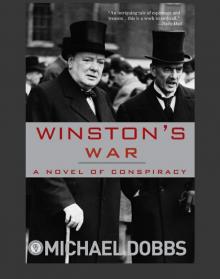 Winston's War
Winston's War The House of Cards Complete Trilogy
The House of Cards Complete Trilogy Saboteurs
Saboteurs The Touch of Innocents
The Touch of Innocents WC02 - Never Surrender
WC02 - Never Surrender Old Enemies
Old Enemies Churchill's Triumph
Churchill's Triumph The Edge of Madness
The Edge of Madness Goodfellowe MP
Goodfellowe MP The Final Cut
The Final Cut Whispers of Betrayal
Whispers of Betrayal Churchill's Hour
Churchill's Hour The Buddha of Brewer Street
The Buddha of Brewer Street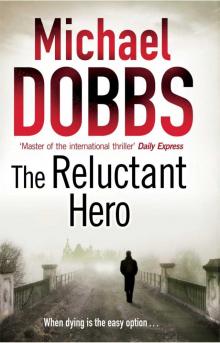 The Reluctant Hero
The Reluctant Hero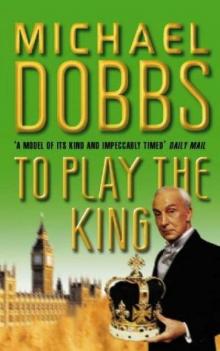 To Play the King
To Play the King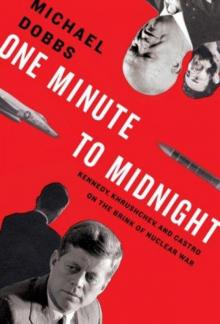 One minute to midnight
One minute to midnight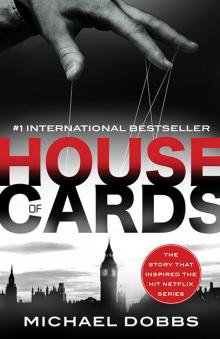 House of Cards
House of Cards The Lords' Day (retail)
The Lords' Day (retail) Whispers of betrayal tg-3
Whispers of betrayal tg-3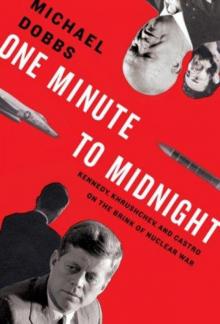 One minute to midnight: Kennedy, Khrushchev, and Castro on the brink of nuclear war
One minute to midnight: Kennedy, Khrushchev, and Castro on the brink of nuclear war The Final Cut fu-3
The Final Cut fu-3 To play the king fu-2
To play the king fu-2 A Ghost at the Door
A Ghost at the Door A Sentimental Traitor
A Sentimental Traitor